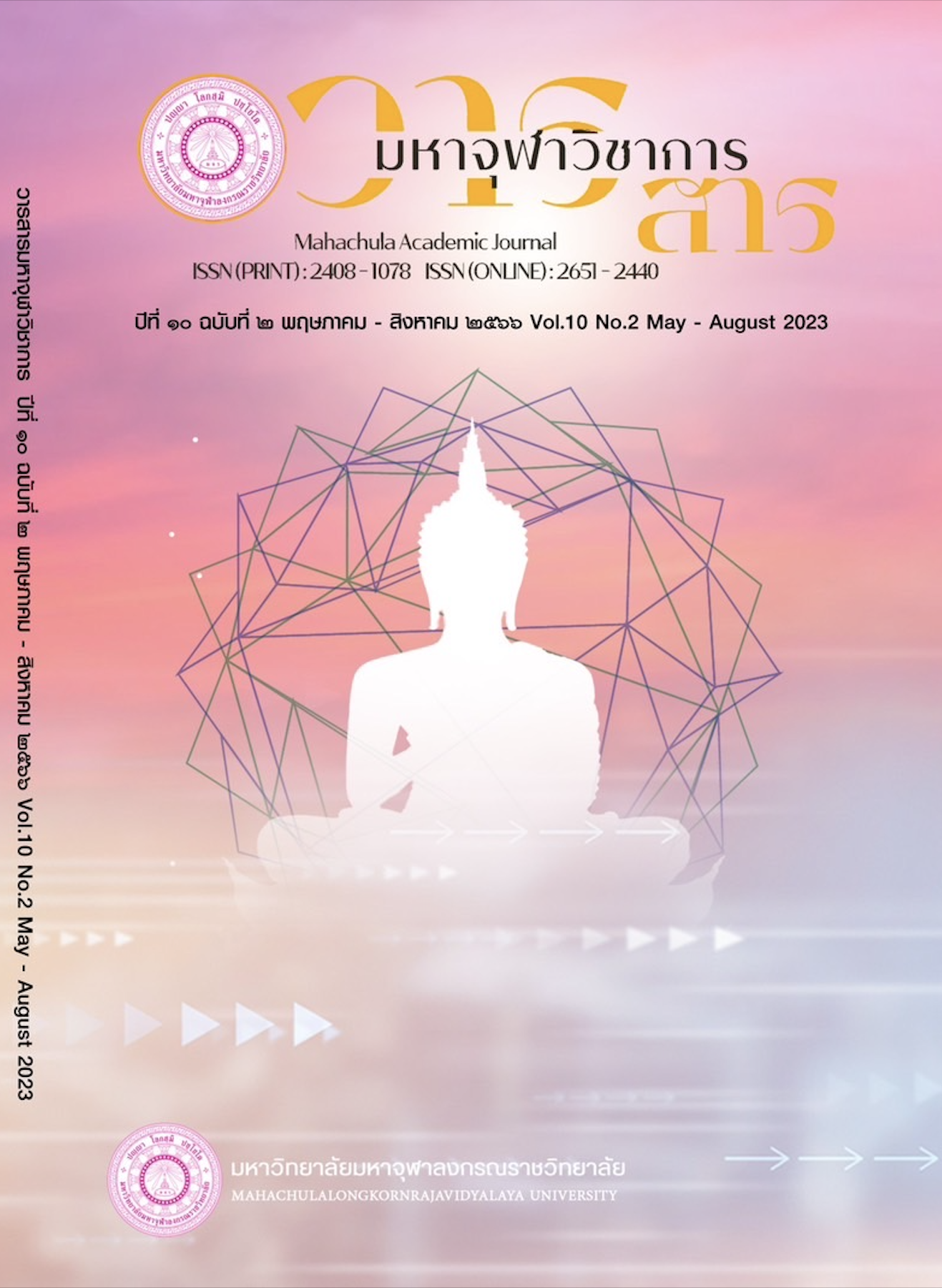A Study of Doubts to Akusala and Kusala in Theravada Buddhist Scriptures
Main Article Content
Abstract
This research entitled “A Study of Doubts that Be Akusala and Kusala in Theravada Buddhist Scriptures” has three objectives: (1) to study the doubt that be unwholesome (Akusala) in Theravada Buddhist scriptures. (2) to study the doubt that be wholesome (Kusala) in Theravada Buddhist scriptures, and (3) to propose guidelines for the abandonment of doubt that be unwholesome whereby it supports the doubt that be wholesome according to Theravada Buddhism. This is the documentary research based on the study of Buddhist scriptures.
From the study, it is found that there are two types of Vicikicchā: (1) Vicikicchānivaṇa, and (2) Vicikicchāpaṭirūpa by which they are suspicious and unable to make decision. While functioning, they hesitate in believing eight things: (1) the Buddha, (2) the Dhamma, (3) the Sangha. (4) Ti-sikkhã, (5) doubt about past life, (6) doubt about future life, (7) doubt both past and future life, and (8) Paṭiccasamuppāda. When Vicikicchānivaṇa arises, it stimulates Akusala to arise blocking the way of doing good actions, bringing about the danger to Dhamma practice where wisdom cannot be developed higher resulting in getting rid of the attainment of ultimate truth. As regards Vicikicchāpaṭirūpa, it is a doubt of worldly affairs, doubting the names of people, places, teachings and learning including learning Pariyattidhamma, etc., for instance. All can be either Kusala, Akusala or Abyākata. It is said that doubt leads to Kusala and it is also said that Akusala happens to Puthujjana (worldly person), Sotāpanna (Stream-Winner), Sakadāgāmī (a Once-Returner), Anāgāmī (a Never-Returner). The uncertainty leading to Kusala is the doubt about the doctrine, when it is explained accordingly accordance with the Buddhist principles, changes the mindset leading to the right Dhamma practice, which is supported Kusala Dhamma to arise.With respect to the doubt of Abyākata that arises from the Arahanta (the Holy One), it is in a case of doubts about Pariyattidhamma scriptures, names of people, places, etc., because the wisdom of the Arahanta does not compete with the wisdom of the Buddha. There are six guidelines leading to the abandonment of doubt that be Akusala: (1) one should become Bahussuta (man of great learning), (2) one should become a questioner, (3) one should become knowledgeable about the things that have been decided in the Vinaya, (4) possessing Atimokkha (faith), (5) having good friendship (Kanlayāṇamitta) (6) discussing matters that are Sappāya (suitable things). In addition, unwholesome doubts can be suppressed by the power of contemplation and be eliminated with the Sotapattimagga. The factors contributing to the Sammā-diṭṭhi are Paratoghosa (the external sources) and Yonisomanasikāra (carefullyconsideration)
Article Details

This work is licensed under a Creative Commons Attribution-NonCommercial-NoDerivatives 4.0 International License.
References
คณาจารย์สำนักพิมพ์เลี่ยงเชียง. หนังสือเรียนนักธรรมชั้นตรี ฉบับมาตรฐาน บูรณาการชีวิต วิชาพุทธประวัติ. กรุงเทพมหานคร: โรงพิมพ์เลี่ยงเชียง, ๒๕๔๙.
ธีระพงษ์ มีไธสง. มิติทางศาสนาและปรัชญาของโลก. กรุงเทพมหานคร: โอ.เอส.พริ้นติ้ง เฮ้าส์, ๒๕๕๑.
พระญาณธชะ รจนา. ปรมัตถทีปนี. แปลโดย พระคันธสาราภิวงศ์. กรุงเทพมหานคร: สำนักพิมพ์ตาลกุด, ๒๕๔๖.
พระติปิฏกจูฬาภยเถระ รจนา. คัมภีร์มิลินทปัญหาภาษาไทย. แปลโดย คณาจารย์มหาวิทยาลัยมหาจุฬาลงกรณราชวิทยาลัย. พิมพ์ครั้งที่ ๒. กรุงเทพมหานคร: โรงพิมพ์มหาจุฬาลงกรณราชวิทยาลัย, ๒๕๖๐.
พระพรหมคุณาภรณ์ (ป. อ. ปยุตโต). เชื่อกรรม รู้กรรม แก้กรรม. พิมพ์ครั้งที่ ๓๙. กรุงเทพมหานคร: โรงพิมพ์พระพุทธศาสนาของธรรมสภา, ๒๕๕๖.
พระมหาสมปอง มุทิโต แปลเรียบเรียง. คัมภีร์อภิธานวรรณนา. พิมพ์ครั้งที่ ๒. กรุงเทพมหานคร: บริษัท ประยูรวงศ์พริ้นติ้ง จำกัด, ๒๕๔๗.
สมเด็จพระพุทธโฆษาจารย์ (ป. อ. ปยุตฺโต). พจนานุกรมพุทธศาสน์ ฉบับประมวลศัพท์. พิมพ์ครั้งที่ ๓๑. กรุงเทพมหานคร: โรงพิมพ์บริษัท สหธรรมิก จำกัด, ๒๕๖๑.
มหาจุฬาลงกรณราชวิทยาลัย. พระไตรปิฎกภาษาไทย ฉบับมหาจุฬาลงกรณราชวิทยาลัย. กรุงเทพมหานคร: โรงพิมพ์มหาจุฬาลงกรณราชวิทยาลัย, ๒๕๓๙.
มหาจุฬาลงกรณราชวิทยาลัย. อรรถกถาภาษาไทย ฉบับมหาจุฬาลงกรณราชวิทยาลัย. กรุงเทพมหานคร: โรงพิมพ์มหาจุฬาลงกรณราชวิทยาลัย, ๒๕๔๙-๒๕๕๗.


